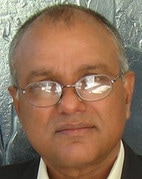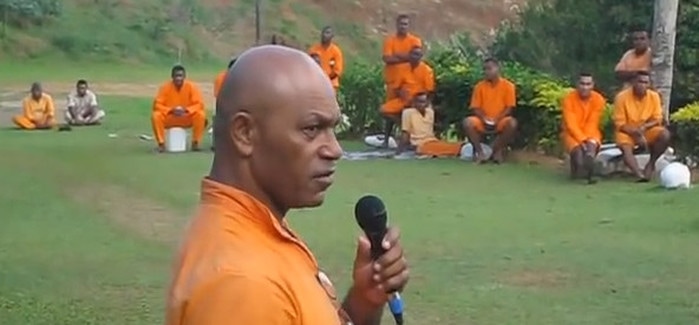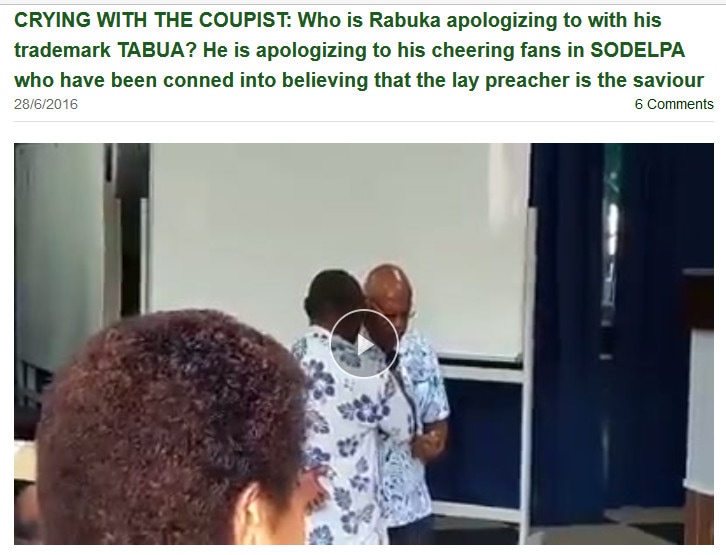"In the middle of the Suva market just after the 2006 coup, when I expressed to him [Riyaz Sayed Khaiyum] my utter disappointment and surprise at his replacing Francis Herman (the previous manager of FBC) for no good reason, he furiously stomped away, yelling “Wadan, you are full of shi*t”, to the amazement of the nearby stall holders and shoppers." - Wadan Narsey
http://www.coupfourandahalf.com/2012/07/khaiyums-22million-bank-loan-to-set-up.html

By PROFESSOR WADAN NARSEY
In 2016, two of Fiji’s main media organizations, the privately owned The Fiji Times and state owned Fiji Broadcasting Corporation, came to public attention, for the wrong reasons- laws regarding ethnic sensibilities in multiracial Fiji.
The international community needs to note that taken together, they call into question the neutrality of Fiji’s prosecuting, regulating and defending institutions.
I make no statement on the neutrality of the judiciary presiding on the case currently- the public can make their own minds up when the judgments are given.
The Fiji Times (Na Lalakai)
On the 27 April 2016, the Nai Lalakai (the Fijian vernacular publication owned and published by The Fiji Times) printed an article by one Josaia Waqabaca who pointed out that a petition had been handed to Aiyaz Khaiyum (Fiji’s Attorney General) to either engage in a “veisorosorovi” (a formal indigenous Fijian reconciliation) with indigenous Fijians or leave Fiji.
The article also alleged:
“The Muslims are not indigenous Fijians. These people are the very ones who have invaded various countries, including Bangladesh in India, and have committed murder there and raped the women and abused their children, until they have come to power, and are now in possession of it”.
The generalizations about Muslims are abhorrent to most decent Fiji citizens and me, while the statement conveniently ignores that some indigenous Fijians are also Muslims.
The Director of Public Prosecutions promptly pressed charges, not just against the article’s author (Waqabaca) and the editor of Nai Lalakai editor (Anare Ravula), but also against the editor of the English language The Fiji Times (Fred Wesley) to whom Ravula reports to, the Fiji Times publisher (Hank Arts) and Fiji Times Limited as well.
The charge was that they made or caused to be published, a statement in the iTaukei language Nai Lalakai newspaper that was likely to incite dislike, hatred or antagonism of the Muslim community.
While the original charges were laid in August 2016 with Magistrate Shageeth Somaratne presiding, the case has dragged on (justice delayed is justice denied?), with the presiding judge being changed at least once.
Opposing the bail variation for Arts
The DPP’s Office has subjected itself to even great public scrutiny through their opposition to a request for a bail variation by the publisher Hank Arts.
The State Prosecutor and Deputy DPP (Lee Burney) alleged that the charges against publisher Hank Arts were “serious” and he should not be allowed to travel to NZ for two weeks. No doubt the presiding judge will decide whether the charges against Arts are serious. But why on earth would the DPP’s Office think that this responsible elderly citizen, who has not a hint of a criminal record, might abscond in NZ? Arts had even offered his two properties in Fiji and his FNPF balance as surety, basically his life savings.
Even more, two prominent Fiji businessmen with unquestionable reputations in Fiji (David Aidney and Jinesh Patel) had also agreed to be Arts’ surety and not travel abroad while he was away. But not just the previous magistrate, but also the current judge, Justice Thushara Rajasinghe, concluded that these financially massive sureties were not enough to grant the bail variation. The judge’s judgment cannot be called into question by mere mortals like me. But the treatment of Hank Arts and Fred Wesley by the DPP’s Office is extraordinary when viewed alongside the contrasting treatment accorded to the CEO of the government-owned Fiji Broadcasting Corporation (FBC) in a comparable situation of the division of responsibility between the producer/editor and the CEO.
Is FBC privileged?
In November 2016, complaints were made by members of the public (Peter Waqavonovono, Seni Nabou and Jope Tarai) against the state-owned Fiji Broadcasting Commission to the Police, MIDA and the Fiji Human Rights and Anti-Discrimination Commission (FHRADC), about the allegedly racist contents of an FBC program Wasea Bhasha in which the host Nemani Bainivalu said in the Fijian vernacular words to the effect that Fijian education was lagging because:
* iTaukei did not speak English; some teachers drank grog all night and came to work lazy; if only iTaukei boys concentrated on their studies and not play, they too could reach universities and graduate.
Bainivalu is also supposed to have said that “many iTaukei boys roam around in the night with their mobile phones, wasting time” and that “Indo-Fijian boys and girls do not roam around in the night”.
The complainants claimed that the content was tantamount to “explicit racism” insinuating that iTaukei people are inferior because they fail in universities because they spend more time participating in sports and that iTaukei people are academically poor because they do not know how to read in English.
THE Citizens’ Constitutional Forum issued a statement noting that “promoting broad generalised comparisons between Fiji’s major ethnic groups without facts to base them is irresponsible journalism.” CCF urged MIDA follow on with necessary investigations and recourse.
The Leader of the Opposition in Parliament, Ro Kepa called on the CEO of FBC to resign and for an investigation to be made. The Leader of NFP (Professor Biman Prasad) asked if MIDA was being neutral and asked him to resign from one of his two posts so that he could do an effective job.
Government reactions
The Chairman of MIDA and FHRCAD Ashwin Raj stated that that the Wasea Bhasha episode contained generalisations and stereotypes that lacked “accuracy, balance and fairness about social progress of the iTaukei community”.
But he concluded that “the program failed to meet the threshold for inciting communal discord.. There was no overt call to violence. … there is no pattern of hostility towards any community… The journalist has offered a public apology in all of the three major languages admitting negligence on his part as the producer and presenter of the program.”
Raj determined that the issue would not be referred to the Media Tribunal.
The Director of Public Prosecutions (New Zealander Christopher Pryde) considered laying charges against the Wasea Bhasha producer and presenter (Bainivalu), the Chief Executive Officer (Vimlesh Sagar), and the Acting Manager (Mohammed Faiyaz Khan).
He concluded that “In order for a charge of inciting communal antagonism to succeed, the broadcast must have been of such a nature and sufficiently egregious to justify the sanction of the criminal law. In other words, the broadcast must do more than simply insult or cause offence to people. .. the item does not reach the necessary threshold for a reasonable prospect of conviction were the matter to go to trial”.
He announced regally “I decline to sanction a prosecution”.
Contrasting the two cases
It is clear that many indigenous Fijians took offence at the ethnic generalizations. But I might even largely agree with the sentiments expressed by Cristopher Pryde and Ashwin Raj on the content of the sentences being translated by Nemani Bainivalu, Bainivalu’s statements were made as examples in a mere language translation program, probably based on Nemani Bainivalu’s own personal observations and views. They were not presented as definitive statements by an FBC expert on the issues.
My personal view is that some of Bainivalu’s statements on ethnic behavioural differences are probably correct in general (for example the detrimental effects of not speaking English, drinking grog excessively, playing sports excessively) and can be backed by survey data from the Fiji Bureau of Statistics and Ministry of Education.
One of Bainivalu’s statements is anecdotal (which ethnic community in general roams around more at night) while one is probably incorrect (which ethnic community wastes more time on mobile phones). But the real issue is not the content of Bainivalu’s translation examples, but the contrasting approaches taken by DPP Pryde and MIDA Chairman Raj to the Fiji Times case, as to who exactly are charged for mistakes made by subordinates.
The approach with FBC
In the FBC case, it is reported that the DPP considered laying charges against the Wasea Bhasha producer and host Nemani Bainivalu (as expected), but only against the acting Chief Executive Officer Vimlesh Sagar and the acting manager Mohammed Faiyaz Khan.
There was no mention of the possible charging of the CEO of FBC, Riyaz Khaiyum or even of the Board Members of the FBC or the relevant Government Minister who are ultimately responsible for FBC, just as some Patels are owners of The Fiji Times and are being charged.
Riyaz Khaiyum hedged that it was an “unfortunate choice of words by the producer/presenter that was in total contradiction to the intention and policy of FBC as a responsible national broadcaster”. When asked if FBC TV has checks and balances in place for the program before it goes on air, Riyaz Sayed-Khaiyum easily passed the buck, alleging that Nemani Bainivalu eventually became responsible for the content of the show, implying that he himself, the CEO or his organization was not in any way responsible.
While the DPP thought that the charges against the FBC were not “egregious” enough (Pryde’s obfuscating version of “outstandingly bad” or “shocking”), the FBC CEO Riyaz Khaiyum thought it bad enough to terminate Bainivalu’s contract.
FBC then ran a slot on TV in English, Fijian and Hindi in which Bainivalu admitted abjectly that he had “acted irresponsibly” and said he had resigned, when he could have also asked “why only me?” Before you rush to compare it all to Pontius Pilate washing his hands off the matter, remember it was not Pilate but the Jews who crucified Jesus, whereas here it was Riyaz Khaiyum himself who gave Bainivalu “the boot” rather than taking any responsibility himself. But more important than futile biblical comparisons, the Fiji public needs to ask why the DPP’s prosecution of the five entities associated with The Fiji Times case was so different when it came to those higher up.
The book is thrown at Fiji Times
Every Fiji citizen with common sense understands that the language proficiency requirements of vernacular papers means that in practice, it is the vernacular editor who makes the day to day decisions on the content of each issue before it goes to print, just as the FBC CEO alleged for his program producer, Bainivalu, before it went to air.
In practice, neither the English edition Editor, NOR the Publisher NOR the owners of the parent publishing company can be reasonably expected to have direct daily roles in the vetting of content in the vernacular, as they cannot reasonably be expected to know the vernacular language enough, just as I doubt if FBC CEO (Riyaz Khaiyum) has any in-depth knowledge of the Fijian vernacular, enough to vet its sophisticated content.
Nevertheless, in The Fiji Times case, the DPP chose to prosecute not only the article author (Waqabaca) and the Nai Lalakai editor (Ravula) but also the English medium editor (Fred Wesley), the English-speaking publisher (Hank Arts) and the (English-speaking) Gujarati owners of The Fiji Times Limited. Whether the English-speaking publisher Hank Arts and Fiji Times Editor Fred Wesley can be held responsible for allegedly racist content in the vernacular newspaper they do not vet in practice, will be decided by the presiding Sri Lankan judge, even if cynics note that it will be under the constitution and media decrees that have been imposed on Fiji without the approval of any Parliament (before any generalizationsa are made about Sri Lankan judges, note that at least one Sri Lankan judge – in the Soko case- has gone against the political tide).
Note that there was no explicit call for violence in the Nai Lalakai/Fiji Times case either, a fact deemed by Ashwin Raj to be pertinent in not charging FBC’s producer/presenter of Wasea Bhasha. But the public can legitimately ask, and indeed, if they want a free media in Fiji, it is their deep social responsibility to ask: are there different prosecuting standards for The Fiji Times CEO and for the FBC CEO?
Is the more severe and protracted treatment of The Fiji Times by the DPP’s Office intended to intimidate them further than has already occurred?
The public (and researchers into Fiji media) are reminded that Riyaz Khaiyum is the brother of the Attorney General (Aiyaz Khaiyum) and he not only became the CEO of FBC in “unusual” circumstances after the 2006 military coup, but his editorial policies have arguably favored the Bainimarama Government, while receiving preferential financial assistance from Government, assistance denied to their primary television competitor (Fiji One) or the private radio communication companies like Communications Fiji Limited.
The peculiar roles of Pryde, Raj and Riyaz
Historians of contemporary Fiji will one day put under the microscope all the many individuals (such as Christopher Pryde, Ashwin Raj and Riyaz Khaiyum) who have kept the Bainimarama Regime ticking over.
Christopher Pryde appeared in Fiji soon after the 2006 coup and quickly assumed prominent positions in the military state’s apparatus, despite the military government being declared illegal by the 2009 Fiji Court of Appeal, a judgment never reversed.
Six years ago, Ashwin Raj was relatively unemployed or underemployed at The University of the South Pacific until two economics professors (no prizes for guessing who) prevailed upon the USP Vice Chancellor to offer him more substantive work, which he eventually obtained under a belligerent and aspiring Deputy VC of USP managing USP’s STAR project (now apparently gone into a Black Hole).
It was not long before the Bainimarama Government discovered that Raj’s gift of the gab requiring the public to futilely buy dictionaries, would be a great asset as Chairman of MIDA. Indeed, media censorship, intimidation and media funding biases flourished under Ashwin Raj’s benign gaze, while he pounced on any allegedly anti-government statements, such as the “kerosene and water” comment by Ratu Timoci Vesikula at a village meeting.
Then Ashwin Raj was also appointed as the Chairman of the Human Rights and Anti-Discrimination Commission, apparently or conveniently choosing not to recognize the many possible conflicts of interest in the two roles (“power corrupts absolutely”?).
The public might note (if they care) that the websites of both MIDA and the Human Rights and Anti-Discrimination Commission are virtually empty of serious content, probably an accurate reflection of the extent to which Ashwin Raj is fulfilling his responsibilities to the wider Fiji society (although no doubt pleasing the Bainimarama Government).
Raj has made no public statement about the curtailment of the basic human right of Hank Arts to travel abroad for two weeks for an important family occasion- the marriage of his step daughter- despite his giving more than ample sureties.
Riyaz Khaiyum was once a good journalist and we oldies will remember his penetrating and humorous interview of Prime Minister Rabuka while both were jogging on the Suva Point sea front after the 1987 coup. Riyaz was also once a friend who invited me to his family’s Eid celebrations, and he is also the son of my once NFP parliamentary colleague (Khaiyum senior) .
But in the middle of the Suva market just after the 2006 coup, when I expressed to him my utter disappointment and surprise at his replacing Francis Herman (the previous manager of FBC) for no good reason, he furiously stomped away, yelling “Wadan, you are full of shi*t”, to the amazement of the nearby stall holders and shoppers.
Well, I have little doubt that according to supporters of coups (whether of 1987, 2000 2006 and 2009), I am full of the proverbial sh*t, largely because of my opposition to them all. But one of the sad outcomes of all of Fiji’s military coups is that the sh*t generated by the coup leaders inevitably sticks to even the well-intentioned citizens who choose to support illegal governments, their laws and their unfair prosecutions (no doubt personal benefits also help).
History may be harsh on coup supporters and accomplices who think that a few “good things” done by the coup makers justify the coups, and their own behavior. But that is no comfort to those who continue to suffer the ill effects of coups and even more into the future when the huge increase in Public Debt has to be paid.
Especially when Fiji history proves that such individuals will merely brush off the “sh*t” before they depart, scot-free and with their ill-gotten gains, to their eventual peaceful permanent abodes abroad, which follow rules of law and social behavior that they so readily helped to trash in Fiji.
An even bigger tragedy for indigenous Fijians and their future is that those that remain in Fiji will be forgiven in “true Fijian tradition” and welcomed back into the fold, without ever fully and honestly revealing, atoning or being punished for their sins.
While the carrots have always been there for those who have supported coups, there have been no sticks to discourage future coup makers.
The incarceration of George Speight is merely a reminder to sleeping historians to explain why that one jailed sparrow does not represent the caging of summer.




